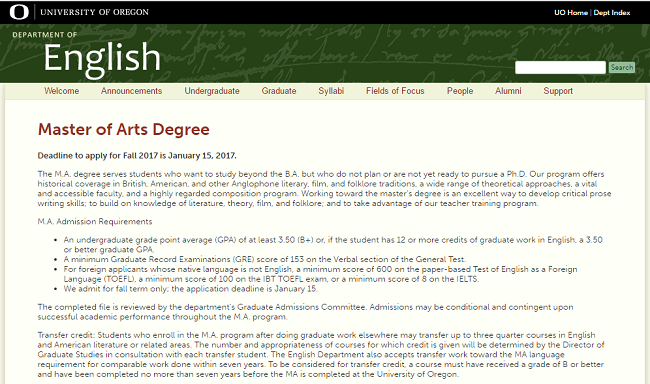
Those taking the TOEFL often want to know how their scores compare to the average TOEFL score. But what is the average TOEFL score? Is your score higher than, lower than, or the same as this average? And even more importantly, is an average score high enough for admission to university?
Here, we’ll explain what the overall TOEFL average score is and then look closely at how this average changes for different groups of test takers. Additionally, we’ll discuss whether an average score is high enough for admission and teach you how to find minimum TOEFL scores for schools.
What Is the Average TOEFL Score Overall?
According to ETS (the creators of the TOEFL), the current average TOEFL score is as follows:
- Reading: 20.5
- Listening: 20.2
- Speaking: 20.4
- Writing: 20.9
- Total: 82
This data indicates that any total TOEFL score in the range of 83-120 is an above-average score, whereas any score in the range of 0-81 is a below-average score. (A score of 82 is exactly average.)
As for the section scores, each average rounds to either 20 or 21. (Note that you can’t actually score decimal points on the TOEFL — only whole numbers.) What this means is that a score of 0-19 on any TOEFL section is below average, whereas 22-30 is above average.
But these aren’t the only averages ETS reports for the TOEFL. Below, we examine how the overall average TOEFL scores change when examining specific groups of test takers.
By the way: we have built the world's best online TOEFL course. Get online practice (TPO-sytle!) and individual grading and feedback on Speaking and Writing.
To be fair, it's possible to get a good TOEFL score studying alone. But PrepScholar is the world's most effective TOEFL course if you are worried about the TOEFL and are struggling to improve your score.
Learn how you can improve your TOEFL score by 15 points today.
What Is the Average TOEFL Score for Different Groups of Test Takers?
So far we’ve given you the overall TOEFL average score and each overall section average. But what if we were to look at the averages for undergraduate applicants only? Or by test takers’ countries of origin?
In this section, we’ll look at how the TOEFL average score changes depending on your:
- Academic level
- Gender
- Native language
- Country of origin
All of the following data comes from the official Test and Score Data Summary for TOEFL iBT Tests PDF.

Average TOEFL Scores by Academic Level
We’ll start off by analyzing average TOEFL scores by academic level.
| Academic Level | Reading | Listening | Speaking | Writing | TOTAL |
| High School | 16.4 | 17.1 | 19.1 | 19.2 | 72 |
| Two-Year College | 18.2 | 17.9 | 19.0 | 19.3 | 74 |
| Undergraduate | 19.4 | 19.4 | 20.2 | 20.5 | 80 |
| Graduate (Non-Business) | 21.9 | 21.3 | 20.8 | 21.7 | 86 |
| Graduate (Business) | 21.8 | 21.3 | 21.1 | 21.7 | 86 |
| English-Language School | 20.0 | 19.4 | 19.7 | 20.0 | 79 |
In this chart, test takers planning to enter graduate programs (both business and non-business) scored the highest total average TOEFL score: 86. This particular trend makes sense since graduate school is the most demanding academic level and generally requires a high command of the English language.
We can also see that high school students, by contrast, scored the lowest TOEFL average score: 72. Again, this trend isn’t a huge surprise, as high school students are typically younger than graduate students and thus have not had nearly as much time to hone their (academic) English abilities. Moreover, high school — being the lowest academic level in this chart — calls for significantly less advanced English skills than graduate programs do.
Finally, there are no major differences between the average scores for graduate (non-business) students and graduate (business) students. For these two groups of test takers, each section average is the same or nearly the same, hinting that your overall academic level has more of an impact on your TOEFL score than your specific field does.
Average TOEFL Scores by Gender
Next up, let’s look at average TOEFL scores by gender:
| Gender | Reading | Listening | Speaking | Writing | TOTAL |
| Male | 20.6 | 20.1 | 19.9 | 20.7 | 81.4 |
| Female | 20.4 | 20.2 | 20.8 | 21.1 | 82.5 |
First off, we can see that women outperform men by a total of 1.1 points. What’s more, women outperform men on all sections of the TOEFL except Reading (on which men outperform women by 0.2 points).
So do these trends mean that women are better at English than men? Not exactly. As you can see above, the differences between these averages are all extremely small — less than one point, actually. In other words, the gaps between men and women aren’t large enough to be considered statistically significant. Thus, we can say there is no discernible difference in English ability when it comes to gender.

Average TOEFL Scores by Native Language
For this section, we’ll examine how the average TOEFL score differs by native language. In the following abbreviated chart, we’ve included 20 major world languages and their average TOEFL scores. All languages are in alphabetical order.
If you do not see your native language on this list, refer to page 13 of the official Test and Score Data Summary for a complete list of languages and their average TOEFL scores.
| Language | Reading | Listening | Speaking | Writing | TOTAL |
| Arabic | 16 | 19 | 20 | 18 | 73 |
| Bengali | 23 | 23 | 23 | 24 | 93 |
| Chinese | 21 | 19 | 19 | 20 | 79 |
| English | 22 | 23 | 24 | 24 | 93 |
| Farsi | 20 | 20 | 21 | 21 | 82 |
| French | 21 | 21 | 21 | 21 | 85 |
| German | 23 | 25 | 25 | 24 | 98 |
| Hindi | 23 | 24 | 24 | 24 | 95 |
| Italian | 23 | 23 | 22 | 22 | 90 |
| Japanese | 18 | 17 | 17 | 19 | 71 |
| Korean | 22 | 21 | 20 | 21 | 84 |
| Portuguese | 22 | 22 | 22 | 21 | 87 |
| Punjabi | 21 | 22 | 23 | 23 | 90 |
| Russian | 20 | 22 | 22 | 21 | 85 |
| Spanish | 21 | 22 | 22 | 21 | 85 |
| Swedish | 21 | 24 | 25 | 22 | 92 |
| Tagalog | 21 | 22 | 23 | 23 | 89 |
| Turkish | 19 | 20 | 20 | 20 | 78 |
| Urdu | 22 | 23 | 24 | 24 | 93 |
| Vietnamese | 20 | 20 | 20 | 22 | 82 |
According to this data, the languages with the highest average TOEFL scores are:
- Dutch: 99
- (Tie) Estonian, German, and Konkani: 98
- (Tie) Danish, Galician, Luxembourgish, and Malayalam: 97
And the languages with the lowest average TOEFL scores are:
- Bambara: 58
- (Tie) Lao and Mossi: 61
- Javanese: 63
It may be no surprise that Dutch and German speakers scored some of the highest TOEFL averages, as these two languages are, like English, West Germanic languages and therefore share several similarities in alphabet, vocabulary, and pronunciation.
Furthermore, many languages of Nordic countries, including Danish, Swedish, and Norwegian, maintain high TOEFL averages, likely due to the large emphasis of English education and its necessity for global relevance.
Why is English included in this chart, though? And why is its average only 93 instead of, say, a perfect 120? Occasionally, native English speakers must take the TOEFL if they:
- Did not grow up in a predominantly English-speaking country
- Are not citizens of an English-speaking country
- Did not attend an English-speaking high school or university
Other native-English-speaking test takers may be participants in ETS studies or aspiring ESL teachers who want to better understand the TOEFL and what it tests.
Ultimately, the reason we are including English here is to emphasize that not even native English speakers are guaranteed to get perfect TOEFL scores. This lower-than-expected average of 92 for native English speakers is most likely a result of a lack of preparation for the exam and an over-reliance on native fluency. Therefore, it’s incredibly important to adequately prepare for the TOEFL, no matter what your native language is!

Average TOEFL Scores by Country
Many students and aspiring students all over the world take the TOEFL, so let’s go over the average TOEFL scores of test takers based on their countries of origin.
The abbreviated chart below contains 28 countries arranged in alphabetical order. For a more extensive list of countries, refer to pages 14 and 15 of the official Test and Score Data Summary PDF.
| Region/Country | Reading | Listening | Speaking | Writing | TOTAL |
| Africa | — | — | — | — | — |
| Ethiopia | 17 | 19 | 20 | 18 | 75 |
| Kenya | 19 | 20 | 22 | 22 | 82 |
| Nigeria | 18 | 19 | 21 | 20 | 78 |
| South Africa | 23 | 25 | 26 | 24 | 99 |
| Uganda | 17 | 19 | 22 | 21 | 80 |
| Americas | — | — | — | — | — |
| Argentina | 23 | 24 | 22 | 22 | 91 |
| Brazil | 22 | 23 | 22 | 21 | 87 |
| Mexico | 21 | 22 | 22 | 21 | 86 |
| Panama | 19 | 21 | 22 | 21 | 83 |
| United States | 21 | 23 | 23 | 22 | 89 |
| Asia | — | — | — | — | — |
| China | 20 | 19 | 19 | 20 | 79 |
| India | 22 | 23 | 23 | 24 | 93 |
| Japan | 18 | 17 | 17 | 19 | 71 |
| Singapore | 24 | 25 | 24 | 24 | 96 |
| Thailand | 19 | 20 | 19 | 20 | 78 |
| Europe | — | — | — | — | — |
| Finland | 23 | 25 | 24 | 23 | 95 |
| France | 22 | 22 | 22 | 21 | 87 |
| Germany | 23 | 25 | 25 | 24 | 97 |
| Spain | 23 | 23 | 22 | 22 | 89 |
| Turkey | 19 | 20 | 19 | 20 | 78 |
| Middle East / North Africa | — | — | — | — | — |
| Egypt | 20 | 21 | 22 | 22 | 85 |
| Iran | 21 | 21 | 20 | 21 | 83 |
| Jordan | 18 | 20 | 21 | 19 | 79 |
| Saudi Arabia | 14 | 16 | 18 | 15 | 64 |
| United Arab Emirates | 17 | 20 | 22 | 20 | 79 |
| Pacific Region | — | — | — | — | — |
| Australia | 22 | 23 | 23 | 23 | 91 |
| French Polynesia | 20 | 20 | 20 | 21 | 80 |
| New Zealand | 24 | 25 | 24 | 24 | 96 |
According to this data, the three countries with the highest average TOEFL scores are:
Want to improve your TOEFL score? We have the world's leading TOEFL course.
Built by world-class instructors from Harvard and MIT, the course offers individual review, interactive lessons, and realistic online praactice, at an affordable price! It's the fastest way to get your target TOEFL score.- Ireland: 100
- (Tie) Austria, Netherlands, and South Africa: 99
- (Tie) Belgium, Denmark, and Switzerland: 98
And the countries with the lowest average TOEFL scores are:
- Guinea: 57
- (Tie) Congo and Côte d’Ivoire (Ivory Coast): 61
- Mali: 62
As we saw with the data on native languages, Western and Northern European countries once again dominate, with many maintaining impressive average TOEFL scores in the mid- to high 90s. South Africa — the only top-three country not based in Europe — also fares extremely well, most likely due to the fact that English is one of its official languages.
What’s perhaps most interesting, though, is that test takers from countries whose main language is English did not score as high as one might assume they would. Despite the fact that the US, Canada, the UK, Australia, and New Zealand all use English as their primary languages, none of these countries cracks the top three spots for highest TOEFL average score!
Here is the average TOEFL score for each major English-speaking country:
- New Zealand: 96
- Canada: 95
- UK: 94
- Australia: 91
- US: 89
As we discovered with the native languages chart above, it’s clear that being a native English speaker or living in an English-speaking country does not automatically guarantee you a perfect TOEFL score.

Is an Average TOEFL Score Good Enough for Admission?
By now, you might be wondering whether an average TOEFL score is actually good enough for admission to US universities. And the answer is, it depends on the school or program to which you’re applying.
At some schools, an average TOEFL score — that is, 82 — is most certainly high enough for admission. At present, the average TOEFL score required for admission to US universities is 78, which is four points lower than the overall average. So essentially, an average TOEFL score should be high enough for many US colleges and universities.
For example, Illinois Institute of Technology requires undergraduates to have a minimum TOEFL score of 80 — just 2 points below average — while the University of San Francisco requires a minimum TOEFL score of 65, which is a staggering 17 points below average! (It should be noted, though, that the University of San Francisco gives preference to applicants who scored at least 80 on the TOEFL.)
At other colleges and universities, however, an average TOEFL score may be significantly lower than what’s required or recommended by the school. One common TOEFL requirement is 100, which is 18 points higher than the average TOEFL score. Prestigious schools such as Amherst, Brown, Columbia, and USC all require or recommend TOEFL scores of at least 100 for undergraduate admission.
So in the end, an average TOEFL score might or might not be good enough for your particular schools, depending on what your schools’ minimum required TOEFL scores are. But how can you find these minimums? Read on to find out!
How to Find Minimum TOEFL Scores for Schools
Most schools that require the TOEFL will also maintain minimum TOEFL scores that applicants must meet in order to qualify for admission. The process for finding these minimum requirements differs slightly depending on whether you’re applying to an undergraduate or graduate program.
Follow the steps below for your program type to find your school’s TOEFL score requirements.
For Undergraduate Programs
For undergraduate programs, schools usually maintain university-wide TOEFL score requirements (rather than separate requirements for each major). Therefore, you’ll want to look for TOEFL information primarily on your school’s main website.
Begin your search on Google by typing in “[School Name] TOEFL requirements” or “[School Name] minimum TOEFL score.” On the results page, look for relevant links to your school’s official website. The following page types are most likely to offer information about TOEFL score requirements for your school:
- Application materials
- Admission requirements
- FAQs
- International admission
- Undergraduate admission
Once on your school’s website, use ctrl + F to search for key words such as “TOEFL,” “English,” “proficiency,” etc. Here are Tufts University’s TOEFL requirements, which I found on an FAQ page for international students:
Who Needs to Submit the TOEFL or IELTS?
All non-native English speakers must submit the TOEFL or the IELTS, unless a student has been in a primarily English medium school for three or more years.
What Are the Minimum Scores on the TOEFL and IELTS?
Tufts requires a minimum of 100 on the TOEFL iBT,* 600 on the paper-based TOEFL, or 7.0 on the IELTS. The Tufts code for TOEFL submission is 3901.
*Emphasis mine.
If you can’t find any minimum TOEFL scores for your school online, try calling or emailing your school directly to ask whether they maintain specific TOEFL score cutoffs.

For Graduate Programs
Because graduate programs are more specialized than undergraduate programs, many programs and departments maintain their own individual TOEFL requirements. These graduate TOEFL score requirements are usually the same as or higher than those requirements set forth by the overall university (for undergraduate students).
To find your graduate program’s minimum required TOEFL scores, start by going to your program’s or department’s official webpage. For example, if I were applying for a Master of Arts in English at the University of Oregon, I’d go to my program’s homepage (remember, your program’s homepage will look different from mine!):

On your program’s homepage, use ctrl + F to look for the words “TOEFL,” “English,” or “proficiency.” If you’re lucky, you might find your program’s TOEFL score requirements on this page, as I did here:
“For foreign applicants whose native language is not English, a minimum score of 600 on the paper-based Test of English as a Foreign Language (TOEFL), a minimum score of 100 on the IBT TOEFL exam,* or a minimum score of 8 on the IELTS.”
Want to improve your TOEFL score by 15 points?
Registration is now open for our best TOEFL course. We guarantee your money back if you don't improve your TOEFL score by 15 points or more.
PrepScholar TOEFL is online and it features thousands of practice questions and 1-on-1 Speaking and Writing review and feedback.
*Emphasis mine.
If you don’t find any TOEFL information on your homepage, look for links to related pages dealing with admission requirements, application materials, FAQs, etc. On each page you try, use ctrl + F to search for “TOEFL” and other relevant words.
If you still can’t find any information about TOEFL score requirements for your particular program, contact your school by email or phone to ask about the kinds of TOEFL scores graduate students are expected to have when applying.
Recap: What Is the Average TOEFL Score?
Currently, the average TOEFL score for all test takers is 82. For each section, the averages are as follows:
- Reading: 20.5
- Listening: 20.2
- Speaking: 20.4
- Writing: 20.9
These average TOEFL scores can change depending on the group of test takers you’re examining. In this article, we’ve given you four sets of data, analyzing average TOEFL scores by:
- Academic level
- Gender
- Native language
- Country of origin
As this data has shown us, native English speakers and those from English-speaking countries do not maintain the highest average TOEFL scores. The most probable reason for this is that many native English speakers fail to adequately prepare for the TOEFL, relying too much on their native English skills and not enough on their test-prep skills.
In general, an average TOEFL score of 82 should be high enough for admission to many US colleges and universities. Nonetheless, highly selective schools will often expect even higher TOEFL scores, usually around 100.
To find your school’s minimum required TOEFL score, go to your school’s website and search for any information relating to the TOEFL or English-proficiency requirements. While most colleges and universities maintain schoolwide minimum TOEFL scores for undergraduate students, graduate programs and departments usually maintain their own TOEFL requirements for graduate students.
What’s Next?
Not sure what TOEFL score to aim for? Our guide offers an extensive list of 60+ popular US schools and their TOEFL score requirements, as well as tips on how to set a TOEFL goal score.
Want to know how your TOEFL score compares with those of other test takers? Look at the current TOEFL percentiles and learn what these percentiles ultimately mean for you.
What’s a good TOEFL score? Read about what constitutes a great, a good, and a poor TOEFL score. Before that, though, make sure you understand how the TOEFL is scored.
Ready to improve your TOEFL score by 15 points?
Download our best TOEFL Strategy eBook (valued at $14.49) for FREE! Learn the top 5 strategies you must know to improve your TOEFL score. Download it for free now:
